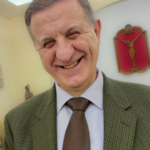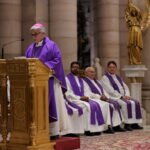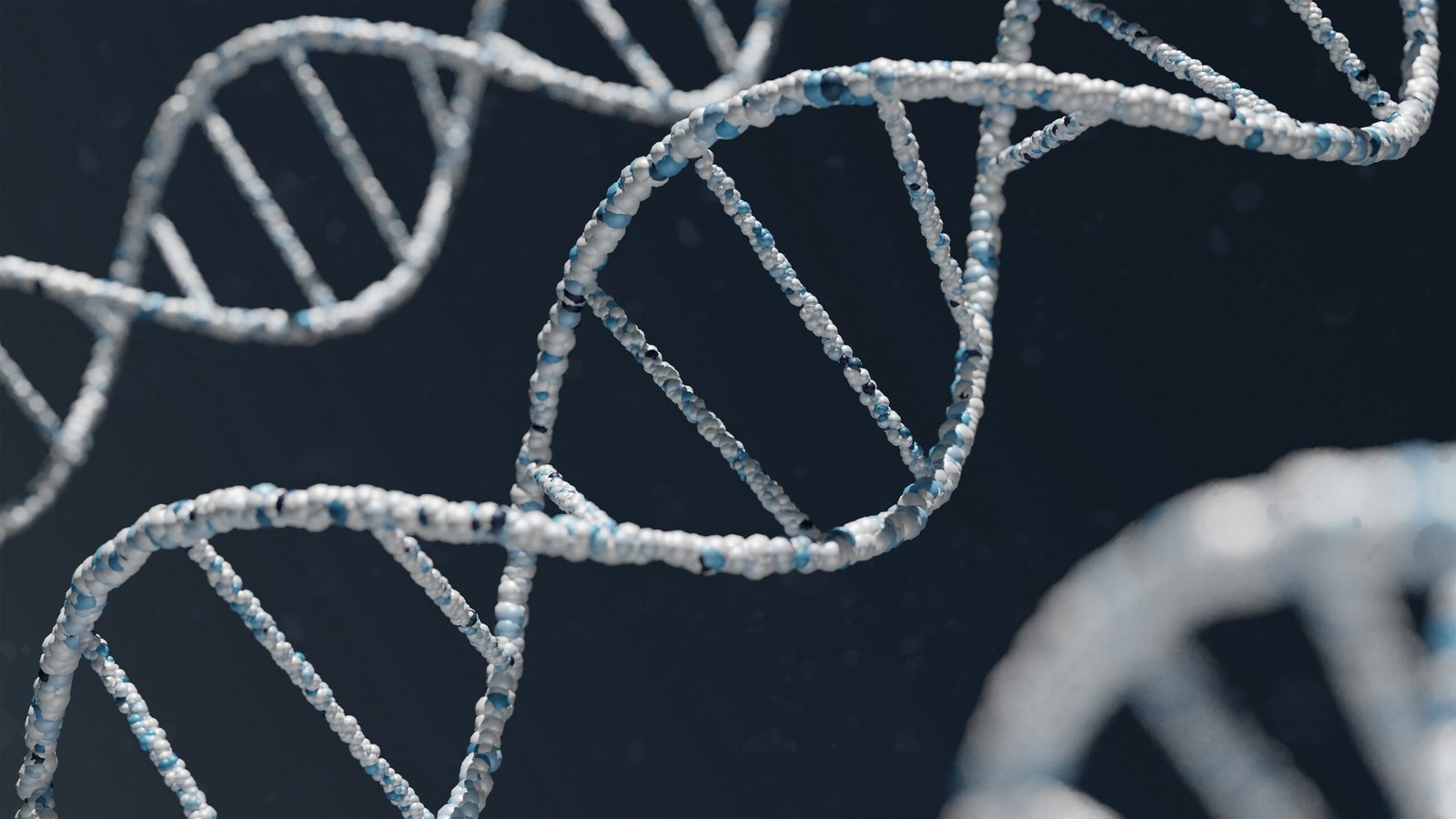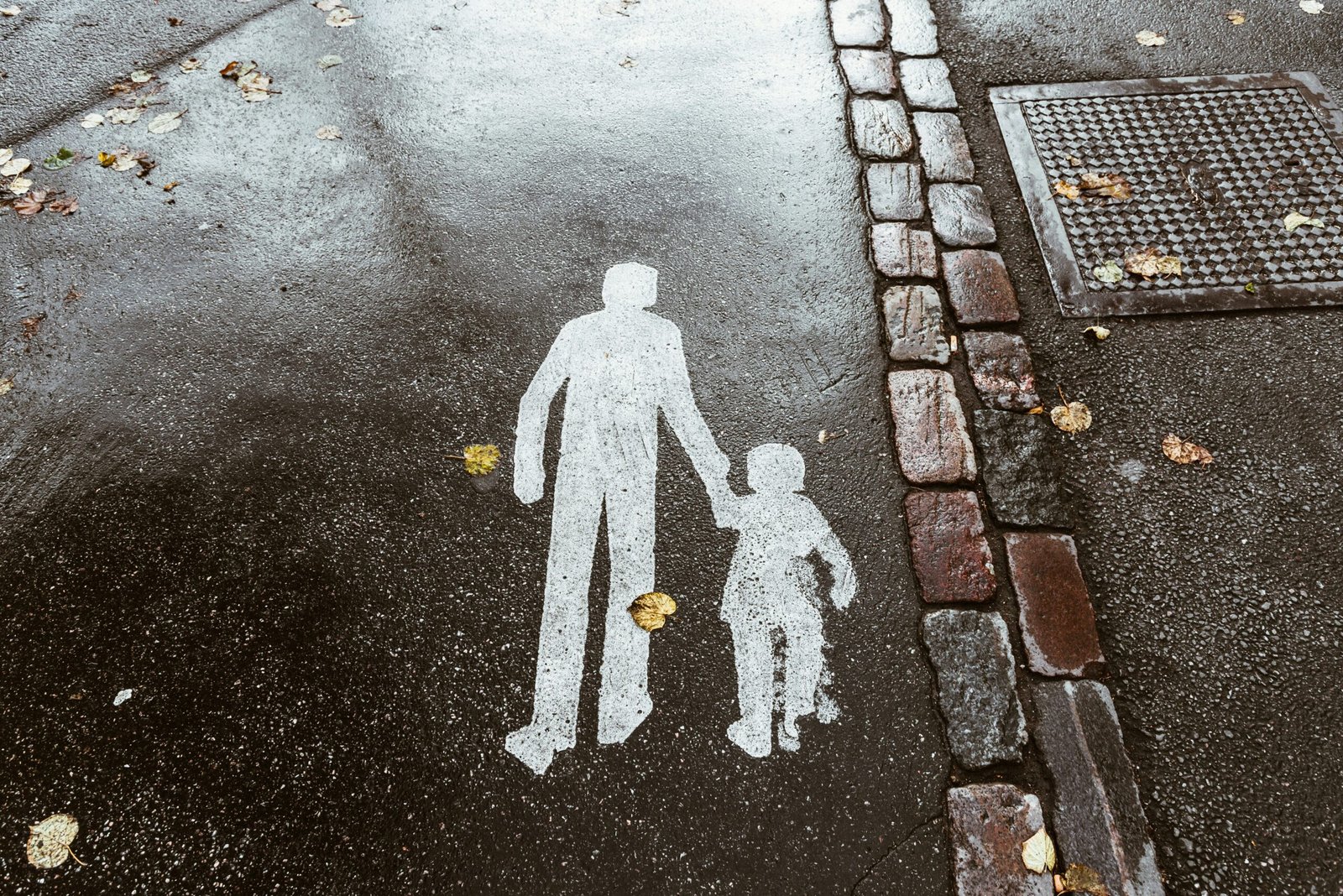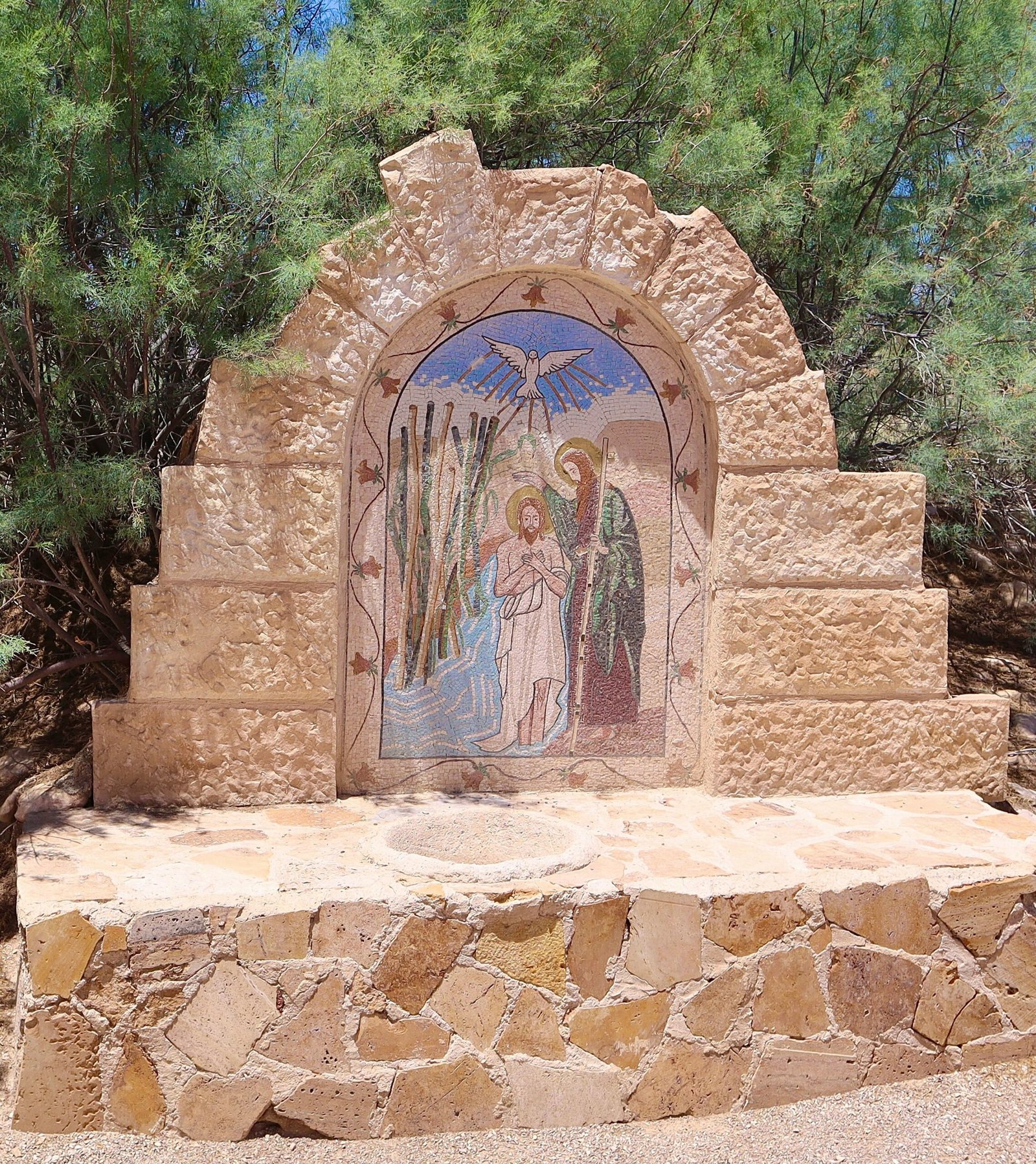
Gospel according to Saint Mark 14:12-16.22-26:
On the first day of the Feast of Unleavened Bread, when they sacrificed the Passover lamb, Jesus’ disciples said to him, “Where do you want us to go and prepare for you to eat the Passover?” He sent two of his disciples and said to them, “Go into the city and a man will meet you, carrying a jar of water. Follow him. Wherever he enters, say to the master of the house, ‘The Teacher says, “Where is my guest room where I may eat the Passover with my disciples?”‘ Then he will show you a large upper room furnished and ready. Make the preparations for us there.” The disciples then went off, entered the city, and found it just as he had told them; and they prepared the Passover.
While they were eating, he took bread, said the blessing, broke it, gave it to them, and said, “Take it; this is my body.” Then he took a cup, gave thanks, and gave it to them, and they all drank from it. He said to them, “This is my blood of the covenant, which will be shed for many. Amen, I say to you, I shall not drink again the fruit of the vine until the day when I drink it new in the kingdom of God.” Then, after singing a hymn, they went out to the Mount of Olives.
Highway to heaven
Luis CASASUS President of the Idente Missionaries
Rome, June 02, 2024 | Corpus Christi
Ex 24: 3-8; Heb 9: 11-15; Mk 14:12-16.22-26
In today’s Gospel, Christ offers the greatest sign of love to his disciples, inviting them to eat his body and drink his blood. Of course, he did not ask to be eaten as if his followers were anthropophagous. So was it simply symbolic, perhaps a poetic way of speaking?
Nothing of the sort; it is a pact, a covenant which, in a few words, means: If you make this simple gesture in memory of me, I will respond by remaining with you. His essential intention is NOT that the disciples understand this gesture, but that they practice it. That explains why he does not give further explanation to those who tell him that “this is too hard” and, even more, he invites the disciples to leave if this seems inadequate or meaningless to them.
In this sense, Peter’s response is inspired, brilliant and very intelligent, because, even without understanding everything, he understands that Christ is the only possibility of a life in fullness and freedom: Lord, where shall we go, only you have the words of eternal life.
Like so many issues in the following of Christ, this is a problem of faith. We believe in Him… to a certain extent. When his proposal clashes with my little experience or my opinion of what is truly valuable… either my obedience ends or I limit myself to a passionless compliance, like Christians who receive the Holy Form and return to their pew… to contemplate the ears of the one seated before them. This lack of faith produces an authentic unitive dissonance: we unite ourselves in an incomplete, superficial way to Christ in the Sacrament. In reality, it is not the same way of acting nor the same attention that we have with a friend who comes to visit us at home.
There is no lack of opposite cases, of those who take the opportunity to have a “heart-to-heart” dialogue with Christ, as Pope Francis has said. It is a matter of sharing, especially in those moments, the greatest concerns, the feelings that God has, as a Trinitarian and family reality. This dialogue always has life-changing consequences. Normally, in an intimate and secret way, but sometimes God decides that it should be with visible signs for everyone, so that we can all feel confirmed in Christ’s promise to accompany us until the end of time.
This was the case of Marthe Robin. She was born in France in 1902, at the age of 2, she suffered a serious illness and at 28 she was completely paralyzed. But her faith in God, her devotion to the Blessed Mother, was as strong as ever. Her illness never affected her faith. However, at the age of 28 she could no longer eat or drink because of her illness. Her only sustenance was the consecrated host, the Holy Eucharist. And so would be his life for 51 years, no food, no water; only the consecrated host. In November 2014, Pope Francis declared Marthe “venerable,” one step away from the proclamation of her sainthood, manifested in her efforts to help the family in the midst of their extreme weakness, receiving numerous people to comfort them and her intervention in the foundation of a religious family, today spread throughout the world.
This is just one example. There are many more, of miracles throughout the world, which tell us that this consecrated host, present in all the Catholic churches of the world, is the real presence of Jesus. In the words of the very young Blessed Carlo Acutis (1991-2006), who will soon be canonized, the Eucharist is truly our highway to heaven.
But more important are the intimate miracles that the Eucharist continues and will continue to produce. The initiative to give his Body and Blood is God’s, but so is the decision on how and when we are transformed by this food. Many of us are not fully aware of the effects of this sacrament, surely because we have prejudices or expectations – almost superstitious – of how grace should work.
—ooOoo—
Finding a treasure is not the same as receiving it from a person. It is not the same to rejoice in the find as it is to be able to thank and reciprocate to the one who gives us a gift.
An experienced hunter from an African tribe hunted two wild turkeys. On his way home he had the impression that he was being followed; he turned and saw a thin, hungry boy walking behind him with outstretched hands. The hunter was moved and left the birds on the ground and motioned to the young man to take them. Despite his hunger, the boy kept his distance from the birds. He did not want to pick them up. Only when the hunter put them in his hands did the boy receive them.
The Eucharist after consecration does not remain on the altar, Christ needs to be received by us with all reverence, listening to his call upon us, the unique way he wants our cooperation. We must become what we receive so that Christ may come into our world. Take and eat, this is my body given for you. This is my blood shed for you. The covenant is sealed when we receive Him in faith to enable us to risk our lives for others and find expression in our covenant with one another.
In the Eucharist, Jesus comes to be with us, to walk with us. But he wants us to receive the gift of his word and say: We will do what you ask of us. Thus it becomes clear, even for us, what it means to approach the Eucharist: it is not a devotional encounter with Jesus, but a decision to be like Him at all times, bread broken at the disposal of our brothers and sisters, a continuous search for how to give our blood, which is our life, for the good of our neighbor.
When I was in elementary school and there was some “serious” conflict between two classmates, for example, whether a goal had been valid or not in a recess soccer game, a circle would form and the two concerned would start fighting. The unwritten rule did not allow the use of instruments other than fists, and the case was closed when one of the two began to bleed from the nose. The blood marked the end of the conflict. Usually, the two contenders would be seen soon afterward playing and running together. I am not sure if this is a relevant anthropological example, but it illustrates the universal importance of blood, the value we all place on it, in all cultures, at all times.
Also some Semitic peoples and other cultures sealed their covenants with blood. An animal was sacrificed and, when the blood was spilled, it was equivalent to saying: let this happen to the one who does not keep this covenant.
Sacramental Communion is a time to assume the will of the Father, (that is why we recite the Lord’s Prayer) a time to put ourselves at peace with one another, and then approach the Eucharist to receive Jesus as Lord in our hearts while making our hands a throne to receive Him and then eat and drink in faith. It is a sacramental banquet in which we truly receive Christ, who now wants to act in us for our neighbor.
—ooOoo—
In the First Reading, the motley group of Jewish slaves who had been freed, set free from the yoke of slavery by God, arrived at Mount Sinai, where Moses received and read aloud the Ten Commandments. Moses then enacted a covenant between the people and their God; a God who had promised: I will be your God and you shall be my people. An altar was erected, an animal was sacrificed, and Moses collected the blood of the animal in a bowl and sprinkled half on the altar and half on the people, after they had agreed to observe all the commandments.
They knew that God had taken the initiative. In the Sinai covenant, God promised the people that he would always be with them and care for them as his own people, guiding their future, as long as they faithfully kept the covenant, lived in love and cared for the poor.
God would always be faithful, even if his people turned away from keeping the covenant. Today we hear of people making a “prenuptial agreement”. But that is not a covenant, but a contract, which practically says: “If you do not fulfill the terms of our agreement, then it is over and I will leave. And I make sure of what is mine before I start.” That is the logic of justice and contracts in this world.
But a pact means putting my life on the line for the other. If you need my blood for a transfusion, it is yours! It is a commitment of mutual love, for each chooses the other and promises to be faithful to him or her in good times and bad, in sickness and in health, until death do them part. This is why marriages are celebrated with full meaning during Mass. Because during the Eucharistic celebration we see Jesus giving us his whole being, his body and his blood. The new covenant became a reality in the Blood of Christ. The night before his death, Jesus said: This is my blood of the covenant which is poured out for many. He put his whole life on the altar.
St. John Mary Vianney put it very aptly: There is nothing so great as the Eucharist. If God had anything more precious… he would have given it to us. Only the Eucharist has the ability to unite us, sustain us, strengthen us and guide us properly, not only on the path of this life, but on the path to eternal life. Knowing this, when life becomes rough, unsettling and difficult, we can trust and cling to this gift we have in the real presence of Christ. This real encounter with God celebrates God’s unconditional love for us and grounds us in the truth of who we are in a way that nothing else could do.
Let us not forget how Christ, in instituting the Eucharist, declares the purpose and finality of this new and definitive sacrifice: to shed his blood on behalf of all, for the forgiveness of sins.
This is why the Gospel says that, at the moment of Jesus’ death on the cross, the curtain that closed the sanctuary of the temple was torn in two from top to bottom (Mk 15:38). The barrier, erected by sin, that separated men from God was torn down forever.
_______________________________
In the Sacred Hearts of Jesus, Mary and Joseph,
Luis CASASUS
President







